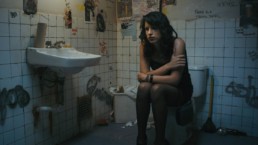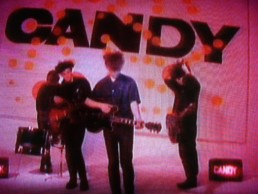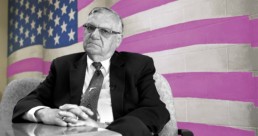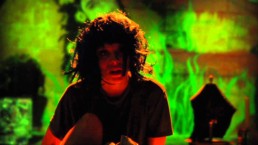Review: 'Appropriate Behavior'
Desiree Akhavan is a name to remember. In the breakthrough queer cinema movie Appropriate Behavior, Akhavan plays Shirin, a socially awkward, bi-sexual, twenty-something, haplessly wandering through life as she deals with a broken heart. After being forced to move out of the one-bedroom Brooklyn apartment she shared with her girlfriend Maxine (Rebecca Henderson), Shirin makes it her mission to get over her former flame, while simultaneously plotting revenge through encounters she thinks will make her ex jealous. When that fails, because ultimately, all revenge plots do, Shirin is left in her own head in this deadpan comedy, and her existential crisis is fully realized for our enjoyment.
The lead actress is also the director and screenwriter, and while balancing three of the film's most demanding roles may seem certainly taxing, Akhavan sure does a good job of making it look easy. Cinematically, Appropriate Behavior is not a demanding watch, and on the same coin, the script reads like witty banter Akhavan might have with her friends, making this film seem like the perfect territory to showcase her talents.
I say that only in the highest of regard, Akhavan is making a name for herself on her own by creating content that appeals to the cool kids and the outsiders, the freaks and the geeks, all wrapped up in this contemporary film Appropriate Behavior, just as [Lena] Dunham has done in the past...
Shirin's behavior throughout the film is anything but appropriate, giving this title a play on words and an instant laugh. There are many awkward family situations she finds herself in, especially since she has yet to come out to her parents, claiming that the apartment and bed she and Maxine shared was a new "European" trend to save money. Further discomfortingly funny behavior is seen when Shirin is invited over for a three-way by a man she meets at a bar. While not really into guys, she does her best to give him random pecks on the chest, but with his girlfriend, she can't help herself from being too passionate. Things get awkward when the man finally catches on to the situation, making this one of the film's more cringeworthy, but memorable, scenes.
Everyone (e.g.: Vulture) is saying that Akhavan is the Persian equivalent of Lena Dunham (It was announced that Desiree will be joining season 4 of Girls with a reoccurring role). I would have to agree, and I say that only in the highest of regard, Akhavan is making a name for herself on her own by creating content that appeals to the cool kids and the outsiders, the freaks and the geeks, all wrapped up in this contemporary film Appropriate Behavior, just as Dunham has done in the past (with her feature Tiny Furniture, and now Girls). The large tattoo that covers her arm a lá Lena (which I would hope is just a coincidence) is the typical trademark of a New York hipster, which Shirin definitely is. Her fast-talking nature, her self-critical demeanor, and her all around quirkiness plays a bit familiar on-screen, but there is no denying that she can capture the audience's attention and keep it.
As a filmmaker, Akhavan understands the genre and culture of today's DIY society and plays to that audience. This quirky, lesbian comedy isn't just a nod to LGBT, there is also a lot of talk about being Persian. Sometimes, too much. Sprinkled throughout the cunning dialogue between her ex, her bubbly and flamboyant best friend Crystal (Halley Feiffer) and even her semi-employer, full-time stoner friend Ken (Scott Adsit), the "I'm so different, I'm Persian" card is played one too many times. The first time, it's genuinely funny, but the sixth time, not as much. But overall, this film is not only a great achievement for Akhavan, it is a thoroughly entertaining and genuinely funny film that is just the beginning of great things for her career, as a writer, director, and actor.
https://www.youtube.com/watch?v=NdfcKGKNa04
Review: 'Pump'
I've never been happier to stop at the gas station recently. Gas for under $3 a gallon? These prices make planning a spontaneous road trip that much more tangible. I never really stopped to think about how or why gas prices change, and after watching the documentary Pump, I have a better, although not entirely clear, understanding. One thing was made clear to me, we have a right to choose how we fuel our cars and that right is not being acknowledged by the government or big oil companies, which means the responsibility for change lays solely on us.
Jason Bateman, typically known for his comedic roles, takes a serious approach as he lends his voice as the narrator of the film. His presence is a highly appreciated one that makes the narrative easier to comprehend and breakdown. Pump is not an easy film to digest, and definitely not one that you can watch while multitasking. Statistics, numbers, and political jargon make up most of the film and although it is interesting, it is difficult to keep the viewer's attention throughout its non-aggressive 88-minute runtime.
The message Pump presents, once you get past the numbers game, is simple: American made replacement fuels will equal more jobs, a healthier environment, and a stimulated, growing economy.
The unpredictable cost of fuel, coupled with the damaging effects to our environment and our dependency to over-seas oil rigs is a scary future that we find ourselves looking at today. We are forced into limited choices at the pump, which only creates a stronger foreign dependency and a wealthier fuel monopoly. The message Pump presents, once you get past the numbers game, is simple: American-made replacement fuels will equal more jobs, a healthier environment, and a stimulated, growing economy.
Addiction of any kind is hard to break, and our addiction to foreign oil is no different. Pump takes us on an educated journey through the early days of cars, starting with the transformation of electrical trolleys in 1887 to oil-guzzling buses in the 1960s. We come away with a better understanding of Rockefeller, Tesla, and other influential people who have since changed the oil game. Interviews with top oil executives, journalists, and authors round out this piece of social commentary.
The bottom line is, we can't rely on the government to make the necessary changes for a better quality of life- at least according to Pump. There is no hiding the fact that directors Joshua and Rebecca Harrell Tickell feel very strongly about our right to choose how we fuel our cars, yet the weight of their message doesn't fully hit home- it gets lost among countless facts, numbers and percentages that results in more confusion than clarification. The power of choice is important, and it is this privilege that makes us Americans, but unfortunately, the social impact of this film will be much less than what was hoped for.
Pump is available on iTunes today.
https://www.youtube.com/watch?v=btgHUu45H_4
Review: 'Beautiful Noise'
Those who are going to Coachella this year, listen up: before you grab your flower crowns and face paint, make sure you check out the documentary Beautiful Noise. It's obvious this film was made by a guy who loves music, especially the early underground music scene. Director Eric Green's knowledge of the "shoegaze" genre, the lovely sound of blended and layered guitars mixed with unique vocals, is an inspiring audible journey for music fans, but if you're looking for any sort of storyline, you won't find one here.
The film is devoid of any narrative; rather, it is divided into chapter-like segments with each band getting almost a solid ten minutes of the spotlight intermixed with interviews from other legendary musicians. This trance-like sound first hit the scene with the English band the Cocteau Twins, whose shimmering guitar melodies coupled with singer Elizabeth Fraser's unique voice was dubbed the next big thing in rock & roll.
Billy Corgan of The Smashing Pumpkins, The Cure's Robert Smith and Wayne Coyne of The Flaming Lips all give insightful interviews about their first impressions of these bands, and there's no denying that the musical inspiration here is endless
The Jesus and Mary Chain, bushy haired boys back in 1984, are also profiled. Decked out in grungy plaid button-ups, leather jackets, and Ray-Bans, their hit Just Like Honey plays as the members are interviewed in present day, as they reminisce about the band's early days of figuring out just how they were going to fit- or rather, intentionally not fit- into society's idea of "rock music."
After an hour of highlighting different bands, from My Bloody Valentine to modern acts like M83 and Wild Nothing, the film focuses solely on interviews, which are a bit underwhelming after listening to practically an hour of straight music. This sub-genre has been described as ethereally beautiful and harmonic with a hard time fitting into a specific genre and based without definition. The same can be said about this documentary. While its focus on the bands are intense, Beautiful Noise ultimately lacks any sort of story and plays like an extended old school 90s MTV program.
Billy Corgan of The Smashing Pumpkins, The Cure's Robert Smith and Wayne Coyne of The Flaming Lips all give insightful interviews about their first impressions of these bands, and there's no denying that the musical inspiration here is endless. The effortless, romantic sounds leave the viewer immersed in a synth-like dream, which is welcomed 100%. The music is so impactful, that even Robert Smith admits to playing the Cocteau Twins record alone as he was getting dressed on his wedding day.
Just like the music itself, Beautiful Noise is clearly a DIY passion project. While not the sharpest looking documentary, Green gets his message across with intimate interviews. The artwork for the film is amateur looking, which unfortunately may throw some people off upon first glance at the poster- but past its seemingly naive disposition, Beautiful Noise is a rough and tumble film that truly deserves to be seen.
https://www.youtube.com/watch?v=pFy84s2wchk
Composer Alex Ebert on 'A Most Violent Year'
He is best known for being the lead singer of the band Edward Sharpe and the Magnetic Zeros, and Alex Ebert proves his creativity knows no bounds as he brings the dreamy folk-scape composition to the big screen in A Most Violent Year. This is Ebert's second collaboration with director J.C. Chandor, as he previously composed the score for last year's All Is Lost starring Robert Redford, creating one of the most beautiful ending credit songs, "Amen". Here, Ebert talks to an intimate audience during a special screening and Q&A of Year, and talks about his free-jazz inspiration, working with Chandor, and the process of writing the film's only lyrical song (and one I can't stop playing), "America For Me." He begins:
SO, FILM NUMBER TWO WITH J.C.- THIS TIME AROUND, WAS IT AN EASIER PROCESS?
Well, I knew that I would have a long leash, maybe too long in this instance- I threw a little too much spaggetti on the wall. At first after reading the script, I thought this could be a free jazz score, and so I threw a lot of that at J.C. At first I overdid it, intentionally. I tried everything straight jazz. Some of it did stay, there are still a lot of horns in the score, but yeah it is a reductive process. You don't always just hit the mark and walk away. I wish, but no.
DID YOU LEARN ANYTHING FROM WORKING ON ALL IS LOST THAT HELPED YOU HERE?
I did learn so much from All is Lost, just the idea that music can end when it wants to, is entirely of service as opposed to pop music being a service to you. It is the same predicament as All Is Lost in A Most Violent Year, in a sense- "What does this scene want," "What does this character want."
To me, this is a character study- this is about Abel and his singular, meditative, capitalist trance and as J.C. pointed out to me, the entire movie his eyes are half closed. He is extremely focused, almost sort of sleepwalking, towards his aim. Eventually I realized the strongest thing to do is to try to bring everyone into that atmosphere with him.
For our review of A Most Violent Year, click here.
THERE IS A CUE EARLY ON IN THE FILM THAT SORT OF SUGGESTS THIS "DOOM" LIKE SOMETHING BAD IS ABOUT TO HAPPEN, BUT THEN THIS BASS FLUTE COMES IN LIKE A SENSE OF ASPIRATION.
Abel is a doomful figure to me, and I think the end of the movie translates that graphically. His ambition is like a double edge sword.
WAS THERE A PARTICULAR MELODY THAT WAS THE STARTING POINT?
Yes, Abel's theme. I realized it after the fact, but it's basically Dracula's theme.
[Laughter]
YOU GET TO LET LOOSE DURING THE CHASE SCENE.
It was my first chase scene, I was a little nervous about that because I knew you need percussion... I didn't go study any chase scenes I just started with the basics. I started playing it myself, and the first pass at recording just worked. I think I might've gotten a bit lucky with that.
WHAT TYPES OF INSTRUMENTS DID YOU BRING IN?
Percussive instruments like the piano I found to be a little intrusive, so it was more about things like the flute, the synth, bass. It was one of those movies you had to keep paring back, because it was a slow burn.
YOUR BAND, EDWARD SHARPE AND THE MAGNETIC ZEROS, WAS VERY ACTIVE IN THE LAST YEAR, RECORDING AND TOURING, HOW DID YOU FIND TIME FOR THIS?
You just make the time I guess, it's exhausting for sure, but it's rewarding. Especially when you do get that free reign, you have this canvas and you get asked to make music to imagery and I think the combination of music to imagery is very exciting, it's very different than just writing music, it's special. A lot of people are going to be in a dark room and witness this really profound combination of visual and auditory sound, and you get to contribute to part of that. With that carrot in front of my face, I just made the time somehow.
When I write or perform something that is really great, and to me I feel the same way about "Amen" and I don't feel this way about most of my stuff, something happens that's uncontrollable where I don't feel like I did it.
IN ALL IS LOST, J.C. BROUGHT YOU ON TO DO THE SCORE AND YOU PROVIDED "AMEN," THE WONDERFUL SONG THAT CLOSES THAT FILM, DID THEY WANT A SONG AT THE END OF THIS FILM TOO?
Similar to last time, they gave me a few nudges and winks, but nothing so direct. I didn't think I was actually going to make a song for this. Originally, I wanted to make music that was reactive, a band called Suicide came to mind- a very early punk-synth operation from New York around 1978. I wasn't really able to incorporate that into the score but at the end of the movie, then I felt like, ok, it's time to bring in the noise. I had this 70's beat machine and just laid that down and then I just started free-styling; sort of thinking about Julian's character and without writing lyrics down I just started to record. So [the finished song] was basically the first pass.
DO YOU HAVE THE LUXARY OF LISTENING TO A PIECE OF MUSIC, FOR EXAMPLE, "AMEN," AND BE ABLE TO STEP BACK AND RECOGNIZE THE BEAUTY OF THE MUSIC?
When I write or perform something that is really great, and to me I feel the same way about "Amen" and I don't feel this way about most of my stuff, something happens that's uncontrollable where I don't feel like I did it. I'm in awe of it and I don't know who did it and I'm amazed at how good it is. I'm in awe at the fact that I was apart of it, and that happened to me with "Amen" and when that happens it's a pretty special feeling.
A Most Violent Year is in select cities now.
Review: 'The Joe Show'
The infamous Joe Arpaio may not be a household name (yet), but after watching director Randy Murray's telling documentary The Joe Show, Arpaio's name will be hard to forget. Making headline news from controversial political antics to his self-professed "media-hound" actions, Arpaio is quite the character. You either love him or hate him- there is really no in-between here. What starts out as an homage to the Maricopa County Sheriff quickly turns into an unabashed look into the Sheriff's reign as a political figure that is sure to leave audiences speechless in this documentary.
The Joe Show profiles Arpaio's 20-year career, with a slightly biased approach in which he is seen in a negative light. We are first introduced to Arpaio, the now 82-year-old staunch Republican, as he is singing the Frank Sinatra hit, "My Way." Standing in front of a plain backdrop and staring into the camera, he belts out the lyrics, "But through it all, when there was doubt, I ate it up and spit it out, I faced it all and I stood tall, And did it my way." To those who know Arpaio, or know of him, these lyrics hit close to home. Dubbed "America's Toughest Sheriff," Arpaio has become a globally recognized name for his strict reign as Sheriff in Maricopa County, Arizona.
I can't help but feel like we're feeding the monster with the release of The Joe Show; yes it is an insightful look behind the curtain of the infamous Sheriff, but this attention is most gratifying to Arpaio himself, not the audience.
Enforcing such unorthodox punishments like making prisoners in the jail system to wear pink underwear and decidedly ignoring reported sex crimes to focus excessively on immigration are just a few of the polarizing actions Arpaio has made while Sheriff. The film interviews his friends, family members, and staff to get a semi-balanced portrayal of a man so publicly perceived as controversial. His statements have made him quite a few enemies, he is a man with no filter, which does make for an enjoyable film. Yes, this is the same man who brought up the conspiracy theory that President Obama's Hawaiian birth certificate was fake, with the hopes to disqualify him from the Presidential election. The Joe Show does make one thing extremely clear: politics is a dirty, dirty game.
Overall, there is no denying that Joe Arpaio is an entertaining character. I may be singing a different tune if he was Sheriff of my town, but being removed from the situation through this documentary, we are given the chance to laugh with, and at, him. His publicity stunts are purely to gain attention, and the fact that this film has been made at all is a testament to Arpaio's conscious and even subconscious control of the media. However, I can't help but feel like we're feeding the monster with the release of The Joe Show; yes it is an insightful look behind the curtain of the infamous Sheriff, but this attention is most gratifying to Arpaio himself, not the audience.
The Joe Show is now available on iTunes, Amazon Instant Video, GooglePlay, Xbox, Playstation, and Vudu.
https://www.youtube.com/watch?v=bSB3EDpayjQ
Review: 'Billy Bates'
I wish I could have been inside director Jennifer DeLia's mind as she was making Billy Bates; not only is it a colorful overload for the senses, it's a wonder how she kept track of everything. This film, set in New York and produced by Julie Pacino- yes, daughter of Al- is the epitome of an avant-garde, art-house performance piece. Centered around a struggling artist/ photographer and titular character Billy Bates, the film begs the question: "When life imitates art, where does it all begin?" After successfully watching the film, my answer to that question is still: I have no idea.
The movie is a giant question mark with no answer, much like the literal wording of the script. Billy (James Wirt), a disheveled man in his late twenties (I'd imagine) is asked a series of theoretical questions in an interview-like fashion throughout the film. The questions are extremely intimate, such as asking if there are such things as soul mates, or remembering what his dead mother smelled like. While these thought-provoking questions are sprinkled throughout, there is a somewhat linear story that takes place.
Kaia puts on a blue bob wig à la Scarlett Johansson in Lost in Translation during their romp. It's purpose is never revealed, but I'd have to guess it's because that's "artistic."
As to be expected from this art-house genre film, creativity is pushed into outer-most boundaries. Billy befriends, and later seduces, a singer named Kaia (Savannah Welch) who seems to be his ideal manic-pixie dream-girl. She floats the idea that themes the film- that artists always stand in their own way- leading to a self sabotage that Bates can relate to. They connect on a personal level when they have sex (which doubles as an emotional torture session for Bates) as Kaia forces him to revisit memories of his dead mother and abandoned father, which eventually leads to a stay at a mental institution. Kaia puts on a blue bob wig à la Scarlett Johansson in Lost in Translation during their romp. It's purpose is never revealed, but I'd have to guess it's because that's "artistic."
Billy Bates is not for the faint of heart; it's gritty and raw, much like how I would expect an acid trip to feel like. Kaia is one proponent of Billy's struggles, and as he unleashes his pent-up frustrations physically, the rest of the film plays more of internal. Kaia leaves and Billy is left alone. The literal darkness lasts the entire film; visually we are thrown into a pallet of different hues of blue and black and white images. Emotionally, there is no joy or lightheartedness coming from this tortured artist.
For now, only the lucky residents of New York City will be able to catch Billy Bates as it's only playing in select theaters. There's no doubt that this film will make its way to Los Angeles soon enough though, and it would make for a great midnight movie put on by Cinefamily at the Silent Theater. Honestly, though, I can't say you're missing much.
http://vimeo.com/40361435
Review: 'Remote Area Medical'
It looks like a scene from a Coachella weekend; thousands of people camping in cars, sleeping in tents in empty parking lots and enjoying general tailgating activities. While on the outside this looks like a fun event, it's actually a look at a tough reality. Directors Jeff Reichert and Farihah Zaman capture the story of a healthcare crisis that hits close to home for too many people in the documentary Remote Area Medical- not being able to afford a doctor and resorting to charity outreach as a primary source of healthcare. In this eye-opening film, we get an intimate look at a Tennessee clinic's operation for three days and experience first hand the hardships that many Americans encounter to receive basic medical care.
From the beginning, we are introduced to people with a variety of health concerns, whose sole mission is to be seen by a doctor. Remote Area Medical is an organization that travels to various towns and assists in weekend-long healthcare clinics that are free to whomever shows up and in this film, they travel to Bristol, Tennessee, the birthplace of country music. Since the towns they travel to have higher populations of uninsured people or those who can't afford to drive to a doctor's office, these clinics are overcrowded. Because of the high demand, R.A.M. volunteers pass out tickets on a first come, first serve basis. To ensure a spot in line, and an appointment with a doctor, some people camp out in cars for three nights prior to the clinic's opening.
While it hurts their pride to be waiting in line like cattle to undergo a routine health exam, the truth is that their self-esteem is significantly higher after leaving the clinic
It is not a glamorous situation, and Remote Area Medical doesn't try to convince us otherwise. The flaws in the organization are acknowledged and then passed over. Politics or statistics are not mentioned, this is not a propaganda type film. It is people-driven whose story on its own is enough to want to evoke a change and find out more about this organization.
These people are not victims, and they are not painted as such, but they do evoke extreme sympathy. For many, R.A.M. is the only way they can see a doctor, dentist, or optometrist, and the pure gratitude and joy that they feel after leaving the clinic is heartwarming. While it hurts their pride to be waiting in line like cattle to undergo a routine health exam, the truth is that their self-esteem is significantly higher after leaving the clinic. It's a psychological sacrifice every one of them is willing to make.
Unfortunately, that fact is that the "Remote" in "Remote Area Medical" isn't totally accurate; the people in need come from all over the United States, from places where doctors should be readily available. Even though we are supposed to be living in "the land of opportunity," R.A.M. founder Stan Brock points out that with the limited medical access in these towns, these people might as well be living on the moon. What Reichert and Zaman portray in this film is that the problem is local, but fortunately, Remote Area Medical is proving to be extremely effective. And while charity will never replace an official healthcare system, the benefits that this organization provides, as reflected in this documentary, will hopefully grow its availability by leaps and bounds for those who depend on it. One thing's for sure, I've never seen someone so happy to see the dentist until I saw this film.
https://www.youtube.com/watch?v=R6Jb4PQ4PZs
Review: 'Girlhood'
Girl power comes from French cinema in this classic coming-of-age story; female-centric and empowerment driven Girlhood is centered around 16-year-old Marieme and her struggles with peer pressure and self-discovery. While the tale may be repetitive, director Céline Sciamma gives fresh visuals and dramatic flare to the film, which is captivating from the very start. Set in the lower class suburbs of France, Girlhood is as much an emotional journey as it is a visual one and a satisfying film from beginning to end.
Karidja Touré makes her acting debut as Marieme, a recent school dropout and lost soul. Growing up in a dysfunctional home, Marieme is forced to act older than her 16 years. She looks after her two younger sisters while her mother works the night shift doing janitorial work to make ends meet. Her subsequent lack of focus in school causes Marieme to lose her chance of getting accepted into high school, and her dreams of a normal life are shattered. Just as it seems her life is over, she meets Lady (Assa Sylla), Adiatou (Lindsay Karamoh), and Fily (Mariétou Touré), three older girls who recruit Marieme to be the fourth member of their "cool girl clique" and, unbeknownst to everyone, change her life for the better.
Girlhood is as much an emotional journey as it is a visual one, and a satisfying film from beginning to end.
The girls are tough- they are a part of this unspoken underground girl gang that gets into fights with others and don't play nice. Despite their tough chick attitudes, their street style is completely envious (to Marieme and, admittedly, me). Over the course of a few weeks, the girls take Marieme under their wing and transform her from the homely looking girl with long braids and drab clothing into the sleek hair, leather jacket wearing, high top sneaker strutting, fashion conscious "it girl." The clothes aren't the only thing that transform Marieme; over time, it becomes clear that these girls have become like a surrogate family to Marieme, as her own dysfunctional one doesn't get any better. Upon striking up a relationship with her brother's friend, Marieme is forced to make a life-changing decision to take control of her life, and doing only what's best for her.
Girlhood, which, by the way, is not a female answer to Richard Linklater's Boyhood, is very performance driven and an actor's dream. Karidja Touré carries the film on her small shoulders, projecting various emotional moments with strength. One scene in particular is very special to the film; the four girls rent a hotel room and get all dressed up in formal wear to just hang out with each other and drink alcohol. Eventually, they play Rihanna's "Diamonds" and begin dancing away their problems from the outside world. This moment in the film is captured so beautifully, it could have (and should have) been Rihanna's official music video. The blueish tones of the room, the general feeling of sisterhood, and the miming of the lyrics while dancing around in beautiful dresses show the girls' dreams of a better life, but making the most of what they have in that moment. It's a very powerful scene, which ultimately gives Girlhood its authenticity as the perfect portrait of the undeniable complexity of adolescent life.
https://www.youtube.com/watch?v=PqeBXrNZpto









